
|
Arhivska verzija strani |
|


RIC Slovenska Bistrica kot vodilni partner je skupaj s 13 partnerji iz 13 evropskih držav pripravil projekt ENSURE - »European Network for the Cohesion and Solidarity in Rural areas« ali v slovenskam prevodu »Evropska mreža za kohezijo in solidarnost na podeželju«. Poleg RIC-a projektno partnerstvo sestavljajo partnerji iz Grčije, Italije, Madžarske, Češke, Hrvaške, Romunije, Srbije, Latvije, Bolgarije, Španije, Črne Gore in Poljske.
Projekt se bo izvajal med julijem 2017 in julijem 2019 in je zastavljen s ciljem večanja zavedanja o tem, da so lokalni in evropski kreatorji javnih politik tisti, ki ustvarjajo iniciative in umeščajo potrebe lokalnega podeželskega prebivalstva v širši evropski politični kontekst. Izhajajoč iz dejstva, da je v tem času podpora evropskim politikam na najnižji ravni, je potreben razmislek, kako se soočati z evroskepticizmom na podeželskih območjih ter katera so potencialna orodja za rešitev tega problema.
V okviru projektnih aktivnosti bo organiziranih 6 večjih mednarodnih dogodkov, od katerih bo eden izmed njih – mednarodna konferenca – potekal tudi v Slovenski Bistrici, predvidoma spomladi 2019. Razprave bodo potekale o aktualnih temah, kot npr. kateri so praktični primeri uspešnih zakonodaj in kje so zakonodajne ovire na področju spodbujanja lokalne samooskrbe.
European Network for the Cohesion and Solidarity in Rural Areas (ENSURE) is a cooperative project of 14 local and regional bodies from the European Union, Montenegro and Serbia, implemented between July 2017 and July 2019. It is co-funded by the Europe for Citizens program.
The project tries to mainstream active European citizenship throughout the topics which are rarely linked with it in a direct way, such as the rural development and Common Agricultural Policy. This allowed to reach citizens who are not primarily interested in exploring EU citizenship. In the course of the project they gained a better understanding of it, as well as the motivation to be more active at Union level.
Establishing the European Network for the Cohesion and Solidarity in Rural Areas serves to increase the relevance of local and European policy makers as actors developing initiatives that address the needs of rural citizens in the context of EU policies, European citizenship and democracy tools. Lacking competences when addressing complex realities of rural citizens can cause frustrating consequences, such as: ineffective strategies, misplaced policy measures and actions that may lead to even greater lack of understanding of the EU and amplify Euroscepticism. In a time where citizens confidence in EU decision making is at an all-time low, and especially the support from rural citizens is rapidly declining, this project aimed to understand Euroscepticism, and then to build European approach by making use of available EU democracy tools, as well as by providing new engaging instruments for citizens.
ENSURE engages volunteers, policy makers and experts from 14 organisations, 13 countries (11 - EU, Serbia and Montenegro) - 6 local bodies, 5 Federations and bodies representing local authorities, 1 regional body, and 2 CSOs.
The project addresses day-to-day issues which are prevalent for rural citizens: heritage vs. local development, cross-border mobility of agricultural workers, food security, social exclusion. By bringing up issues that acquire great interest among rural citizens, this project can hit such questions as: the decline of support of the EU, Euroscepticism and the EU citizenship on rural areas. The long-term outcome is a lasting partnership. Project aims will be met through 6 big transnational Events, follow-up local actions held in at least 13 countries, accompanied by dissemination tools- a Webinar, 2 Publications, a website and activities in social media. In total the project results will be delivered to over 1600 participants directly, and to min. 50.000 indirectly to ensure the European outreach.
For any questions regarding any aspect of the project European Network for Cohesion and Solidarity in Rural Areas (ENSURE), the Europe for Citizens programme, or active citizenship as a democratic practice, please do not hesitate to contact us: malgorzata.wochowska@gmail.com – Gosia Wochowska, ENSURE Project Manager.
ENSURE on Facebook: https://www.facebook.com/ensurenetwork/
#ensuresolidarity #EUfunding #Euproject #europeforcitizens
Attached you can find a short introductory presentation about the project, its goals, and main activities: https://www.slideshare.net/GosiaWochowskaPhD/ensure-presentation-gosia-wochowska
The success of ENSURE lies in the variety of its partners. They represent 13 European countries, including Serbia and Montenegro. The Network is coordinated by Razvojno Informacijski Center Slovenska Bistrica from Slovenia.
| BULGARIA | Municipality Trudovets |
| CROATIA | LAG „Central Istria“ |
| CZECH REPUBLIC | Hranicka Rozvojova Agentura |
| GREECE | University of Thessaly |
| HUNGARY | Kistarcsai Kulturális Egyesület |
| ITALY | Associazione Alessandro Bartola |
| ITALY | Futuro Digitale |
| LATVIA | Ligatne Municipality |
| MONTENEGRO | Municipalitie Kolašin |
| POLAND | Municipality of Lask |
| ROMANIA | Alba County Council |
| SERBIA | Fond „Evropskiposlovi“ Autonomne Pokrajine Vojvodine |
| SLOVENIA | Razvojno Informacijski Center Slovenska Bistrica |
| SPAIN | The Federación of Municipalities of Madrid |
Attached you can find a brochure we prepared in order to show you the 14 the partners of the ENSURE Network who represent local and regional authorities, federations of public bodies, a University, and Civil Society Organizations.
“Meet the partners and their local realities”
https://www.slideshare.net/GosiaWochowskaPhD/ensure-network-brochure
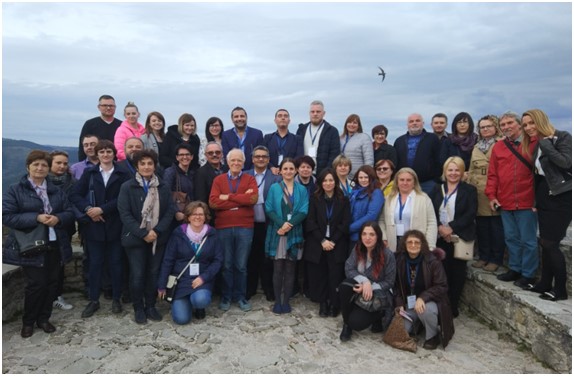
Delegates to the second project Event, Croatia, April 2018
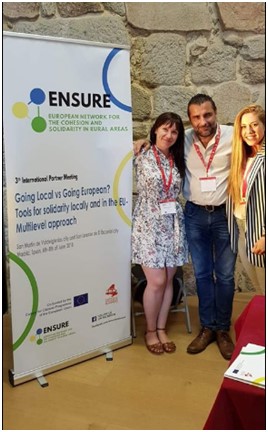
Partners during the fourth project Event, Madrid and region, Spain, June 2018
ENSURE on Facebook: https://www.facebook.com/ensurenetwork
There were six international meetings organized within the project for an overall number of 700 citizens from 13 EU countries, representatives of municipalities and regions, Local Action Groups, NGOs, agricultural cooperatives, agrarian universities and schools, cultural centers and local authorities, students, youths and adults. The events were followed by local activities: debates, lectures, workshops in each of the countries involved.
EVENT 1
Slovenska Bistrica; SLOVENIA, October 2017
Topic: Kick-off Event in Slovenia. Needs, characteristics and commonalities of rural areas across Europe
EVENT 2
Pazin, Porec, Motovun, CROATIA, April 2018
Topic: Common Agricultural Policy (CAP) from a new perspective
EVENT 3
Madrid and region; SPAIN, June 2018
Topic: Going local vs. going European? Tools for solidarity locally and in the EU – multilevel approach.
EVENT 4
Pesaro and region; ITALY, October 2018
Topic: Participatory democracy in local development strategies
EVENT 5
Volos; GREECE, March 2019
Topic: Impacting the young generation
EVENT 6
Slovenska Bistrica and region; SLOVENIA, June 2019
Topic: Evaluation and setting of the ENSuRe Network NGO
The six international events aimed to prepare partners to organize their own follow up activities in each country which we called: Actions for Solidarity - a series of local activities managed by local facilitators.
The local activities included: workshops, debates, meetings with citizens and policy makers, fairs, lectures, and many more. Their topics covered all aspects of rural development as per local needs combined with rights and obligations of EU citizens, EU Citizenship Reports, volunteering in Europe, narratives of Europe. This allowed to reach another thousands of citizens across Europe.
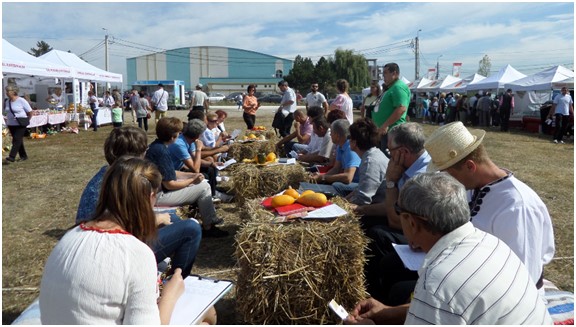
Local follow up activity of ENSURE in Romania, September 2018
Euroscepticism means criticism of the EU and European integration. It can also mean opposition to and total rejection of the EU (anti-EU-ism). Understanding and debating Euroscepticism was one of the strongest objectives of the project. We realized that politicians of all levels need more adequate tools and approach to address it, especially in light of the European Elections 2019. That’s why the ENSURE partners together explored the phenomena of Euroscepticism in Europe in general, and in their own local areas.
As a part of the project, an analysis of the roots of Euroscepticism was conveyed among the project partners. The aim of the analysis was to better understand diverse aspects related to Euroscepticism within the partner group, as well as analyse how much we as policy makers, public officers, activists and academics differ from the general public with regard to our approach to the European agenda and democratic participation.
The survey was designed in reference with:The results of the survey were a basis for discussion among the ENSURE partners. It was interesting to see how much more optimistic about the EU were the answers given by ENSURE partners compared to the general public –provided in the Standard Eurobarometer, 2017. We also revealed a far higher level of engagement in democratic processes which may explain why we were so active within this project which required voluntary actions.
Do we need to promote Europe? Analysis of Euroscepticism, Gosia Wochowska:
https://www.slideshare.net/GosiaWochowskaPhD/gosia-wochowska-euroscepticism-do-we-need-to-promote-europe
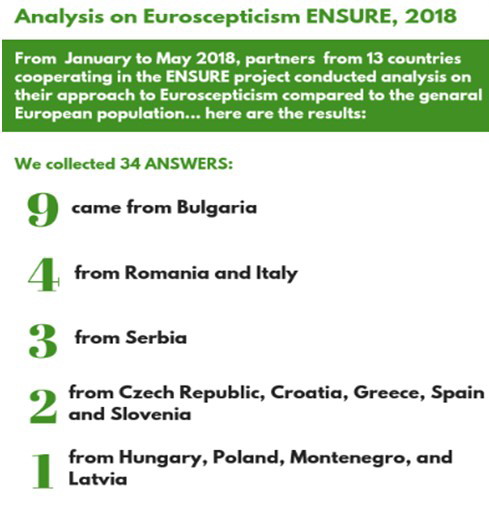
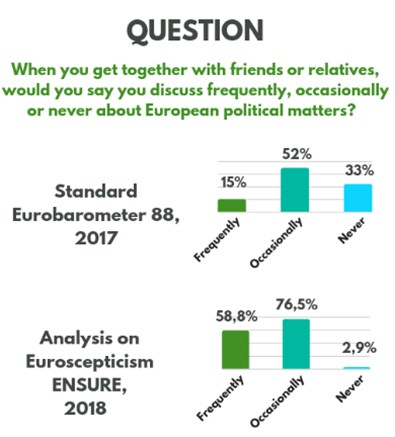
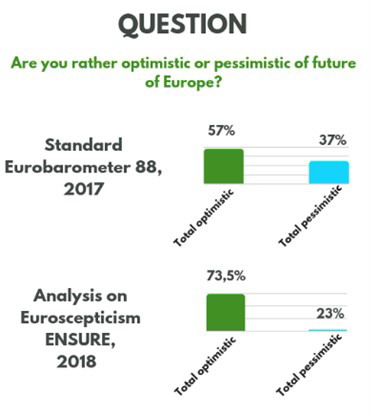
The aim of the ENSURE network is to foster European citizenship and democratic participation by making EU's social and political dynamics more understandable and relevant to citizens living in rural territories.
The project addressed issues where they are the most burning – in rural and peripheral areas. This is why its topics focused on heritage, Common Agricultural Policy, food security. The EU Common Agricultural Policy is supposed to serve as one of the factors in favor of the Euroidentity on the local level. On the other hand, this policy causes tensions between citizens, farmers, local and national governments, and it brings up questions of equal treatment and solidarity in Europe. The project deepened reflection on these kind of paradoxes, by attracting citizens to work on rural-specific aspects as factors that are predictive of a strong support/opposition to the European integration.
The final project publication entitled “Cohesion and solidarity in rural areas - how do local actors get engaged in European policy making” is addressed to policy makers, public officers, experts, civil society representatives, volunteers and citizens who are active (or who would like to become active) at any levels of policy making and democratic participation – from local to European. The publication was prepared by local and regional public officers, policy makers, academics and NGOs from 13 countries: Slovenia, Bulgaria, Croatia, Poland, Hungary, Czech Republic, Greece, Italy, Romania, Montenegro, Serbia, Spain and Latvia, who cooperated as partners within the European Network for the Cohesion and Solidarity in Rural Areas - ENSURE in the years 2017-2019. In the course of two years, the ENSURE partners developed transnational actions and local actions regarding a combination of two main subjects of the project: rural development and European citizenship. The project was possible thanks to the funding from the Europe for Citizens Programme of the European Union.
This publication consists of three distinctive parts: the first one focuses on Local Action Groups as examples of direct local democracy, the second one introduces you into the topic of innovation in agriculture, and then reveals our local approach and perception of the European Common Agricultural. The third part one tackles the key subject matter of the project - Euroscepticism.
We hope that you will find this combination of topics inspiring and helpful when planning your own transnational cooperation projects and transnational networks. Please do not hesitate to contact us in case you had any questions, thoughts or comments.
Visual results
Watch a movie from the fifth international partner meeting in Volos, Greece in March 2019 on YouTube: https://youtu.be/t3GaL_3Kc94
Watch lectures, presentations, short videos from the project on our FB page:
https://www.facebook.com/ensurenetwork/
#ensuresolidarity #EUfunding #Euproject #europeforcitizens
Final publication - Cohesion and solidarity in local areas 2019 European project ENSURE
Downloadable from:
https://www.scribd.com/document/415069706/Cohesion-and-Solidarity-in-Local-Areas-2019-European-Project-ENSURE
Or
Downloads
Povezave:
Objave:
»Z vpisom svojega e-naslova in s klikom na gumb »Pošlji« dajem prostovoljno in izrecno privolitev, da lahko Razvojno informacijski center Slovenska Bistrica moje spodaj vpisane osebne podatke zbira in obdeluje ter jih uporablja za komunikacijo z mano in me po elektronski pošti, telefonu ali pisno obvešča v zvezi z aktualnimi dogodki ter ponudbo storitev, ki jih izvaja.«
Ta privolitev je dana za čas do preklica. Svojo odločitev o privolitvi lahko kadarkoli prekličete, tako da kliknete povezavo za odjavo v nogi elektronskega sporočila, ki ga prejmete z naše strani, ali pa nas kontaktirate na info@ric-sb.si. S podano zahtevo po odjavi s seznama za obveščanje bo vaš osebni podatek izbrisan iz predmetnih zbirk podatkov. Ravno tako imate pravico vpogleda in posredovanja informacije, katere vaše osebne podatke Razvojno informacijski center Slovenska Bistrica hrani v zbirki podatkov, do spremembe ali dopolnitve osebnih podatkov. V tem primeru nas kontaktirate na info@ric-sb.si ter izrazite svojo zahtevo po vpogledu. Z vašimi osebnimi podatki bomo ravnali skladno z zakonskimi določbami, strokovno in odgovorno.
»Z vpisom svojega e-naslova naslova in s klikom na gumb »Pošlji« izrecno potrjujem, da sem seznanjen(-a) z vsebino privolitve ter s pravicami do vpogleda, prepisa, kopiranja, dopolnitve, popravka, blokiranja in izbrisa mojih osebnih podatkov ter s pravico do vložitve pritožbe.« Upravljavec osebnih podatkov je Razvojno informacijski center Slovenska Bistrica, Trg svobode 5, 2310 Slovenska Bistrica. Za vse informacije v zvezi z vašimi osebnimi podatki se lahko obrnete na info@ric-sb.si. Vaše podatke bomo obravnavali diskretno. Več informacij glede zakonskih določil varstva osebnih podatkov najdete na spletni strani ric-sb.si.